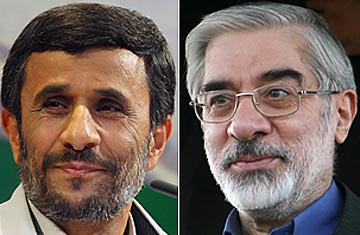
Iranian President Mahmoud Ahmadinejad and challenger Mir-Hossein Mousavi
(2 of 2)
Both political camps contain stalwart members of the political establishment, and both claim to be trying to hold the Islamic Republic to the promise of the revolution that created it in 1979. Ahmadinejad may talk about rescuing a revolution that has strayed from its wayward path, but Mousavi's supporters have made a ritual of going onto their roofs every night at an appointed hour to scream "Allah u'Akbar" (God is great), the Islamic chant popularized as a political slogan by the revolution of 1979. It's hard to style this as a revolt against the system when, in fact, the primary demand of the millions who have joined the protests is that their votes, for one of the more managerially competent and pragmatic stalwarts of the regime, be counted. (Those who seek overthrowing the system entirely have routinely advocated boycotting the polls.)
The struggle may be among warring factions within the system itself, but many of those on the streets demanding their rights nevertheless have a significant stake in its outcome: If the system cannot be changed peacefully through the ballot box because of the hard-line establishment's unwillingness to heed to popular demand for change — albeit change within the limits of the system — then what peaceful means for change are people left with?
And if the struggle at the top leads people to conclude that working within the limits of the system is hopeless, both factions risk losing, since, at the end of the day, they sit in the same boat. Neither side can afford a complete collapse of the system, because that would be the end of all of them. The question, then, is who will blink first.
Trita Parsi is an Iran scholar and president of the National Iranian American Council. He is also the author of Treacherous Alliance: The Secret Dealings of Iran, Israel and the United States.
